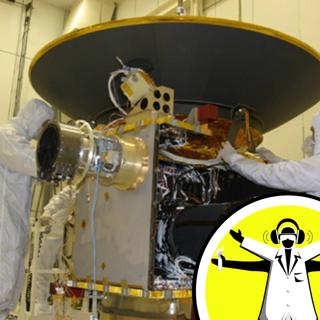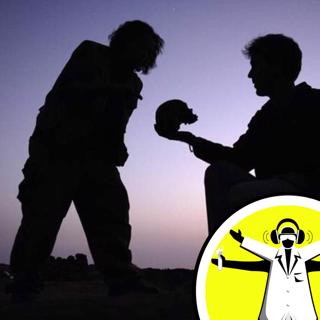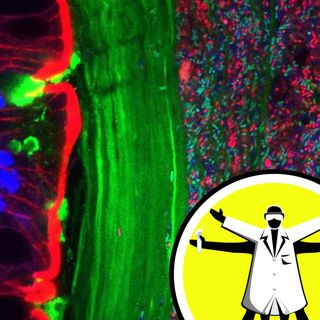
How We Hear, Echolocation and Giant Whoopee Cushions
Helping us tune into the science of sound this week is Bob Carlyon, who explains how we hear, how we can concentrate on one voice in a noisy room, and what it sounds like to have a cochlea implant. From the hard of hearing to the most finely tuned ears on the planet, Ian Russell describes how the greater moustached bat catches prey in complete darkness while flying at 40 miles per hour, Trevor Cox turns the sound of breaking wind into a record breaker as he talks about the biggest ever whoopee cushion, and in Kitchen Science, Derek and Dave investigate the science of balance with the help of a... Like this podcast? Please help us by supporting the Naked Scientists
21 Okt 20061h

Science of Sight, Eye Diseases and Animal Vision
Taking a look at the science of sight is consultant ophthalmologist Nick Sarkies, who will discuss eye diseases and how we can treat them, and Ron Douglas provides insight into colour vision and how the world appears though the eyes of animals. Sticking with our animal focus, Bob and Chelsea reveal that there may be three times as many poisonous fish as there are snakes, and in Kitchen Science, Derek Thorne stops himself bouncing off the walls long enough to discover how superballs spin. Like this podcast? Please help us by supporting the Naked Scientists
14 Okt 200655min

How Cancers Form, Cancer Biology and Future Therapies
Cancer biology goes under the microscope this week, as Gerard Evan talks about the causes of cancer and how cancer spreads around the body. Also on the show, and joining us live from the National Cancer Research Institute Conference, is Fran Balkwill who will be discussing cancer treatments and the development of targeted therapies, and Kat Arney, who will be talking about the latest news in cancer research. We also travel Stateside for a Sciencce Update from Bob and Chelsea, hear from Michael Halpern from the Union of Concerned Scientists about governments interfering with scientific... Like this podcast? Please help us by supporting the Naked Scientists
7 Okt 200654min

Naked Science Question and Answer and New Horizons
Answering all your cosmic conundrums this week are Drs Chris, Dave and Phil who discuss why blood is red, the size of the ozone hole, how to make magnets, the best way to get rid of excess mucus, and sticking with the gooey theme, Adam Summers discusses how some tarantulas keep a firm hold on the ground by producing sticky silk from their feet. Moving much further away from terra firma, New Horizons scientist Hal Weaver talks about the mission to Pluto, what they hope to find there and why the Kuiper Belt objects are so intriguing, and in Kitchen Science, Derek Thorne and Hugh Hunt carry out... Like this podcast? Please help us by supporting the Naked Scientists
30 Sep 200656min

Catalysts for Cleaner Environments and Future Energy
Chemistry and lightning quick reactions are under discussion this week as Emma Schofield explains what a catalyst is, how catalytic converters work and how catalysts can help to clean up the atmosphere, and Fraser Armstrong discusses fuel cells, using hydrogen as a fuel and how enzymes naturally found in bacteria are making hydrogen a more realistic energy source for the future. In Kitchen Science, both guests are used as guinea pigs as Dave Ansell demonstrates the wonder of enzymes with nothing but a slice of bread... Like this podcast? Please help us by supporting the Naked Scientists
23 Sep 200657min

Peruvian Mummies, Ancient Environments and the Sahara
Explaining how science can help us dig up the past is Lawrence Owens, who uses teeth and bones to uncover the life and sometimes gruesome death of mummies in Peru and Bolivia, and Harriet Allen describes how the pollen record and layers of lake sedimentation can reveal what the environment was like 10 000 years ago. Also on the show, Nick Brooks talks about how climate change in the Sahara may have given rise to complex human societies, and taking us back even further in human evolution is Clive Finlayson, who discusses how a new fossil discovery shows that Neanderthals were alive and kicking... Like this podcast? Please help us by supporting the Naked Scientists
16 Sep 200655min

Hot Nectar, Warming Weather and Birds Missing the Spring
In the hot seat this week is Beverley Glover, who will describe how flowers warm their nectar to entice passing pollinators, real life weatherman John Law discusses weather predictions and how to calculate temperature days in advance, and Marcel Visser explains how warming weather and earlier springs spell disaster for migrating birds. Also on the show, we will hear from Katey Walter about a new source of atmospheric methane, and in Kitchen Science, Derek and Dave get their hands wet in the name of discovering how the human body judges temperature. Like this podcast? Please help us by supporting the Naked Scientists
9 Sep 200659min

Naked Science Question and Answer
The Naked Scientists are back to answer all your burning science questions. Dr Chris, Dave and Helen tackle hot flushes, why spiders love living in our houses, how many stars are in the Milky Way, and why cows in a field always face in the same direction... We will also be connecting direct to Norwich, the host of this years British Association Science Festival, to hear about a world record attempt at the most people in a bubble, and sticking with bubbles, Dave and Derek make lava lamps in Kitchen Science. Like this podcast? Please help us by supporting the Naked Scientists
2 Sep 200654min





















